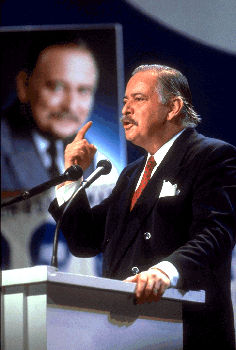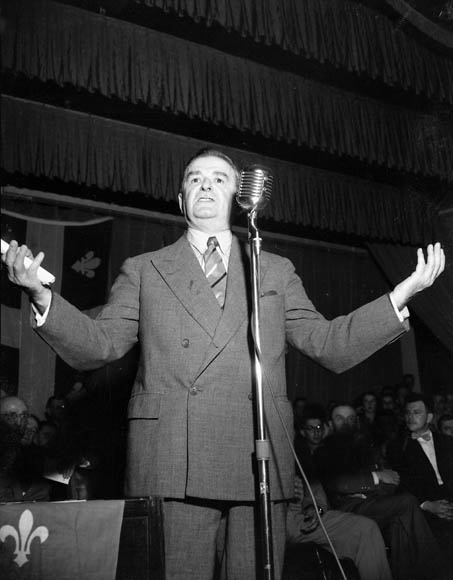The Quiet Revolution (Révolution tranquille) was a time of rapid change experienced in Québec during the 1960s. This vivid yet paradoxical description of the period was first used by an anonymous writer in The Globe and Mail. Although Québec was a highly industrialized, urban and relatively outward-looking society in 1960, the Union Nationale party, in power since 1944, seemed increasingly anachronistic as it held tenaciously to a conservative ideology and relentlessly defended outdated traditional values. (See also Grande Noirceur.)
In the election of 22 June 1960, the Liberals broke the hold of the Union Nationale, taking 51 seats and 51.5 per cent of the popular vote as compared to the latter's 43 seats and 46.6 per cent of the vote. Under Jean Lesage, the Québec Liberal Party had developed a coherent and wide-ranging reform platform. The main issue of the election was indicated by the Liberal slogan, "It's time for a change." As a new middle class battled for greater control over Québec's economic resources, bitter and divisive attempts were made to redefine the role of francophone society in Canada.
Lesage Administration Reforms
In two years, the Lesage administration managed to carry out or plan many reforms: amongst others, the establishment of a public hospital network (1961), the creation of ministries of cultural affairs and of federal-provincial relations (1961), and the foundation of the Société générale de financement (General Investment Corporation) in 1962. A new age began as every aspect of society came under scrutiny. The government attacked political patronage and changed the electoral map to provide better representation for urban areas. To reduce the size of secret electoral funds, it limited authorized expenditures during election periods. It also lowered the voting age from 21 to 18. Lesage attempted to put the public purse in order by promoting a dynamic provincial budget and by raising loans. From 1960–61 to 1966–67, the budget grew from $745 million to $2.1 billion. The rapid and dramatic development of government institutions and the vastly increased role of the state in the province's economic, social and cultural life unleashed forces that would have major consequences. Most notably, the Catholic Church's role in society diminished, prosperity for French-speaking Québécois grew, and a nationalist consciousness expanded.
The pressures exerted by the baby boom generation, which had now reached adolescence, created a dramatic situation and pushed Québec's weak educational system to its breaking point. The government introduced new legislation on education and established the Commission of Inquiry on Education, which was chaired by Mgr Alphonse-Marie Parent. The resulting 1964 Parent Report, tackled the entire system. In recommending the creation of a department of education, it questioned the role of the Catholic Church, which controlled the public school system. The church resisted recommended changes, but without success. The Parent Report contributed significantly to creating a unified, democratic and modern school system accessible to the entire population.
The desire to modernize was also evident in the social sphere. Upon taking power, the government decided to participate in the federal-provincial hospital insurance program. In 1964, it introduced three major pieces of legislation: an extensive revision of the labour code; Bill 16, which abolished a married woman's judicial restrictions by which her legal status was that of a minor; and a pension plan.
Maîtres chez nous: Economic Nationalism
The government's main accomplishment in economics was the nationalization of private electricity companies, an idea that was promoted in 1962 by René Lévesque, minister of natural resources. The government decided to go to the electorate on this issue. On 14 November 1962, the Liberals won on a platform for the nationalization of power with 56.6 per cent of the vote and 63 seats. In 1963 all private hydroelectric companies were nationalized. As a result, Hydro-Québec (established in 1944) became one of the largest Crown Corporations in North America. Unlike in previous years, francophones were able to work entirely in French and to develop their technical, scientific, and managerial skills. Such francization also occurred in the fields of education, social welfare, and health services, as well as in all levels and departments of government bureaucracy.

The objectives of nationalization included standardizing rates across the province, co-ordinating investments, integrating the system, encouraging industrialization, guaranteeing economic benefits for the Québec economy through a buy-Québec policy, and making French the language of work in the sector. Hydro-Québec met most of these objectives and became a symbol of success and source of pride for the Québécois. Another major success was the creation in 1965 of the Caisse de dépot et placement du Québec. The Caisse was made responsible for administering the assets of the Québec Pension Plan, which rapidly grew to several billion dollars.
The maîtres chez nous ("masters in our own house") philosophy that permeated the government and its reforms was bound to have an influence on Federal-Provincial Relations. The Lesage government demanded a review of federal policy and won a major victory following a stormy First Ministers' conference in 1964. After initially approaching the federal government for additional funds to meet its needs, Lesage withdrew Québec from several cost-sharing programs — such as pensions, health care, and tax-sharing — in exchange for fiscal compensation. The issue of special status arose when Québec became the only province to opt out of some 30 joint programs that the other provinces stayed with. It was perhaps to calm the anxieties of English Canada and to show his good will that in 1964 Lesage agreed to a proposal for patriating and amending the Canadian constitution by a method known as the Fulton-Favreau formula. This would have allowed the Parliament of Canada to repeal or amend any provision of the Constitution, subject to a veto by any given province on certain major issues, but to a two-thirds majority on others. However, because of the extreme reactions of various nationalist groups within the province, Lesage withdrew his support and dissociated from the other 10 governments that had accepted the formula.
Federal Provincial Tensions
The Québec government also sought to stake out diplomatic ties. In 1961, it opened the Maisons du Québec in Paris, London and New York. However, when Québec signalled its intention to sign cultural and educational agreements with France, Ottawa intervened, asserting that there could be only one interlocutor with foreign countries.
These federal-provincial quarrels raised the question of the place of Québec and French Canadians in Confederation. In 1965, for instance, the Royal Commission on Bilingualism and Biculturalism noted that "Canada, without being fully conscious of the fact, is passing through the greatest crisis in its history. The source of the crisis lies in the Province of Quebec." French Canadian nationalism, which was becoming more and more Québecois in nature, was exacerbated by this crisis. The number of separatist groups increased — some of which adopted more extreme positions — and the Front de Libération du Québec began to engage in acts of terrorism.
At the same time, other francophones were concerned by such growing nationalism. Among them were Jean Marchand, Gérard Pelletier and Pierre Elliott Trudeau, who joined the federal Liberal Party and were elected to Parliament in 1965.
In the mid-1960s, these so-called "wise men" had been recruited by the Liberal Party of Prime Minister Lester B. Pearson in order to enhance francophone participation in federal government and to help Ottawa quell potentially dangerous political clashes with Québec's increasingly neo-nationalist-inspired, and in some cases separatist-oriented, political parties and successive governments. When the Québec Liberals faced the electorate in 1966 they were confident of re-election. But the Union Nationale had renewed its image and attracted dissatisfied individuals among conservatives, nationalists and those who had voted Créditiste in the federal election. The party still had a solid base in the rural areas that were left largely untouched by the Quiet Revolution. On 5 June, the Union Nationale won 56 seats against the Liberals' 50. However, the Liberals obtained 47 per cent of the popular vote whereas the Unionistes, led by Daniel Johnson, obtained 41 per cent.
In the late sixties, the federal government under Prime Minister Trudeau proposed a two-fold strategy to improve federal-provincial relations. To enhance and encourage francophone participation in all national institutions, a policy of official bilingualism was set forth. To guarantee individual rights as well as the rights of Canada's two official linguistic communities, a renewed Constitution with an inserted Charter of Rights and Freedoms was tabled. The first goal was achieved in 1969, with the passing of the Official Languages Act. The second objective was accomplished with the Constitution Act, 1982 (see Patriation of the Constitution), which incorporated a Charter of Rights and Freedoms and a general amending formula based on seven provinces comprising over 50 per cent of the Canadian population. The Quiet Revolution is a major reference point used by successive Québec governments in power since the Liberal defeat in 1966. It is an event used to distinguish the old-guard socio-political structure of the past from the post-Revolutionary paradigm.

 Share on Facebook
Share on Facebook Share on X
Share on X Share by Email
Share by Email Share on Google Classroom
Share on Google Classroom








